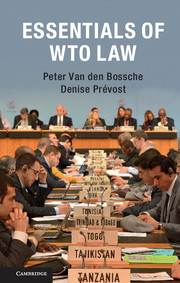Book contents
- Frontmatter
- Contents
- List of figures and tables
- Preface
- List of abbreviations
- Table of cases
- 1 International trade and the law of the WTO
- 2 Rules on non-discrimination
- 3 Rules on market access
- 4 Trade liberalization and other societal values and interests
- 5 Rules on unfair trade
- 6 Rules regarding harmonization of national regulation
- 7 The institutional aspects of the WTO
- 8 The WTO dispute settlement system
- Online resources
- Index
- References
4 - Trade liberalization and other societal values and interests
- Frontmatter
- Contents
- List of figures and tables
- Preface
- List of abbreviations
- Table of cases
- 1 International trade and the law of the WTO
- 2 Rules on non-discrimination
- 3 Rules on market access
- 4 Trade liberalization and other societal values and interests
- 5 Rules on unfair trade
- 6 Rules regarding harmonization of national regulation
- 7 The institutional aspects of the WTO
- 8 The WTO dispute settlement system
- Online resources
- Index
- References
Summary
Introduction
Trade liberalization often facilitates the promotion and protection of other important societal values and interests, such as public health, consumer safety, the environment, employment, economic development and national security. More trade often means that more, cheaper, better, healthier, safer and/or environmentally friendlier products and services will be available on the domestic market. More trade also means more economic activity and development and generates the resources that enable governments effectively to promote and protect societal values and interests.
Trade liberalization, with its principles of non-discrimination and rules on market access, however, also regularly clashes with the aforementioned other societal values and interests. Governments frequently adopt legislation or take measures that restrict trade in goods and/or services in order to protect, for example, public health, public morals, employment or national security.
WTO law provides rules to reconcile trade liberalization with other important societal values and interests. These rules take the form of wide-ranging exceptions to, inter alia, the basic WTO disciplines discussed in Chapters 2 and 3 (the non-discrimination obligations and the market access rules). There are five main categories of exceptions:
• the ‘general exceptions’ of Article XX of the GATT 1994 and Article XIV of the GATS;
• the exceptions for national and international security of Article XXI of the GATT 1994 and Article XIV bis of the GATS;
• the exceptions for safeguard measures of Article XIX of the GATT 1994 and the Agreement on Safeguards;
• the exceptions for balance of payments measures of Articles XII and XVIII:B of the GATT 1994 and Article XII of the GATS;
• the exceptions for regional trade agreements of Article XXIV of the GATT 1994 and Article V of the GATS; and
• the exceptions for economic development set out in ‘special and differential treatment’ provisions and the ‘Enabling Clause’.
These exceptions differ in scope and nature. Some allow deviation from all GATT or GATS obligations; others allow deviation from specific obligations only; some are of indefinite duration; others are temporary. However, all these exceptions have in common that they allow WTO Members, under specific conditions, to adopt and maintain measures that protect other important societal values and interests, even though these measures conflict with substantive disciplines imposed by the GATT 1994 or the GATS.
- Type
- Chapter
- Information
- Essentials of WTO Law , pp. 83 - 140Publisher: Cambridge University PressPrint publication year: 2016



